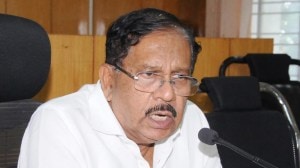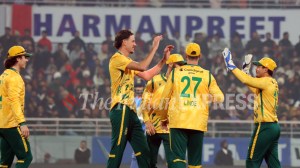Abhishek Manu Singhvi: ‘No one’s asking for stay on entire Waqf (Amendment) Act … when Governors act like Centre’s agents, how is use of Article 142 wrong?’
"I disagree very strongly (with V-P Jagdeep Dhankhar's criticism of the use of Article 142). It was Dr Ambedkar and the framers who thought it fit to trust our Supreme Court and the Supreme Court alone with this special power," says Congress Rajya Sabha MP.
 Senior Congress leader and Rajya Sabha MP Abhishek Manu Singhvi. (Express file photo by Ganesh Shirsekar)
Senior Congress leader and Rajya Sabha MP Abhishek Manu Singhvi. (Express file photo by Ganesh Shirsekar)Congress Rajya Sabha MP Abhishek Manu Singhvi is one of the counsel arguing against the Waqf (Amendment) Act in the Supreme Court. In an interview, Singhvi discusses the case, the charge sheet against Congress leaders Sonia Gandhi and Rahul Gandhi in the National Herald case, and Vice President Jagdeep Dhankhar’s criticism of the judiciary.
The Supreme Court has given an interim order on petitions challenging the Waqf (Amendment) Act, following which the government has placed key aspects of the law on hold till May 5.
I will use measured words since this is a matter of sub judice and I am one of the lead counsel. It depends very much on the narrative being spread by the government regarding the glass being three-quarters full or half full. Despite it being very rare for a fresh Act to have any provision stayed, the Supreme Court, in a momentous order after two days of hearing for almost two and a half hours, has given a stay on three major points. These three major points are the heart and soul of the Act. To suggest that there is no stay of the entire Act is to feign ignorance of the whole legal process.
Are you hopeful that when the court next hears the matter, it will order a stay?
Let me be clear. I don’t think anybody on our side is even asking for a stay on the whole Act. This is deliberate misinformation. I will not repeat the three important points already dealt with by the court. The fourth point, which we intend to canvass before the court on the next date, not yet dealt with, is the stay or modification required of sections 3C(2) proviso read with 36(7a) and (10). We say that they first allow a Collector to declare a dispute in existence. Second, they allow Waqf property to be treated as not Waqf property so long as the dispute is pending. Thirdly, no time limit prescribed for the Collector to decide; Fourthly, they make the registration of a Waqf impossible so long as the dispute is pending. And, finally, they make the access to courts under 36(10) barred on the grounds that this Waqf is not registered, which, in turn, happens because the Collector has not decided the dispute.
We are hopeful that the court will look into this absurd situation. There are several other provisions that we will selectively deal with in the next stage, but there is no question of seeking a stay of the entire 2025 amendment. Nobody has done so and it is the attempt by some to set up a non-existent straw man and then triumphantly shoot it down.
In the National Herald case, are you questioning the timing of the charge sheet? Because, there is a legal process that is playing itself out.
We are questioning everything about the National Herald case: political, legal, media and psychological. Nothing on any of these fronts is satisfactory. As far as legality is concerned, no remote ingredient of money laundering arises in the present case. Firstly, there is no crime, since it is not a crime to assign a debt, and that too to a Section 8 company. Secondly, because there is no movement of a single paisa or a single property. The second ingredient, similarly, does not exist, namely, proceeds of crime. Nobody is shown to have received any proceeds of crime since nothing has moved.
Thirdly, there is no question of laundering, which means using and converting the procedures of crime for the same reason in the last two reasons, Furthermore, it would require heroic foolishness by anybody intending to defraud anyone to convert debt into equity and then hold that equity in a Section 8 company, which is not for profit, cannot pay out any dividends, and carries absolutely no perks. That is why I called this a one-trick wonder, which will make a first-year law student laugh and experienced legal scholars weep.
Regarding the political aspect, it is clear that, firstly, the government wants to keep the pot boiling endlessly and on an ad hoc basis. Secondly, it provides convenient diversions to genuinely relevant issues such as unemployment, falling GDP, Trump’s tariff shocks, and Chinese hard talk. They also want to try and economically cripple the Congress by indiscriminately attaching all its assets.
Why aren’t you approaching the Supreme Court?
There is no question of approaching the court when the trial process is going on. What do we approach against? The ED tried to humiliate and browbeat by about 10 hours of interrogation of a senior person such as Sonia Gandhi a year ago and 55 hours of interrogation of Rahul Gandhi. They also interrogated Mr Kharge, Suman Dubey, and others. Everyone willingly went and gave all the information and papers. Nothing else has happened in a long process of trial which necessitates any court intervention at this stage.
In the context of the recent Supreme Court verdict on the Tamil Nadu Governor issue, Vice-President Jagdeep Dhankhar has said Article 142 has become a “nuclear missile against democratic forces, available to the judiciary”, and that “we cannot have a situation where you direct the President of India”.
I respectfully disagree and disagree very strongly. Firstly, Article 142 was not born yesterday nor used the day before. It has a respectable old lineage going back to jurisprudence of the widest kind over the last 50 years. Secondly, it was Dr Ambedkar and the framers who thought it fit to trust our Supreme Court and the Supreme Court alone with this special power. Thirdly, all the jurisprudence puts very strong self-imposed limitations by the Supreme Court upon itself in the exercise of Article 142.
Fourth, when Governors specially appointed to Opposition states by a Central government, which consciously wants to blow all concepts of federalism to the sky, start behaving more like agents taking instructions from the Centre rather than as independent post holders, how is the use of Article 142 wrong or bad? Fifth, this judgment requires great support and praise, because it is a meticulously researched, highly detailed and comprehensive verdict, raising and formulating issues even during the hearing and giving a chance to all parties to address them.
Sixth, when the conduct of Governors, not only in Tamil Nadu, but also in Punjab and in West Bengal, as also other Opposition-ruled states shows that they typify and vivify Dr Ambedkar’s warning that it is not the Constitution which is bad but man is vile. The institution is only as good or as bad as the people who man it. No draftsman, no Assembly, and no Dr Ambedkar ever dreamt that a Governor would keep Bills spending for over a year; would not even give assent to them after a second referral back by the state government, would not send them for presidential approval in the first round, but to delay matters further would send it for presidential approval after a second referral of the state government. Also give no reasons whatsoever to hold up bills which were 100% within the domain of List Two, namely, exclusive state competence. Ambedkar presumed good sense, high morality and exclusion of ulterior considerations. When they come in, the ultimate custodian of constitutional rights, the Supreme Court, must step in. And I strongly endorse the judgment.
What about his point about the President?
The criticism about the parts of the judgment dealing with the President are equally misplaced. The court was laying down Constitutional principles though there are differences in the two offices of Governor and President on the issue of assent to Bills, the structure and language of the Constitution are virtually identical for both President and Governor. If time limits for Governors can be imposed by the court, there is no reason why the same should not apply to the President. It is but obvious that the second question que Governors does not and will not arise. que the president, namely, reference to the president, nor has the court attempted to deal with that que the president.
What if the President doesn’t give assent in three months?
Exactly on the same parity of reasoning. Since the Constitutional articles are almost identical, there must be a deemed consent. How can it be that the President, on a second referral and on a matter which he chooses not to refer, even for advisory jurisdiction to the Supreme Court, can simply sit indefinitely upon a Bill? So what is wrong with giving a time limit and declaring it to be deemed consent?
The Congress is silent on the issue of Robert Vadra being questioned.
There is no question of the Congress reacting for no reason. An individual is entitled to all their legal rights, which Mr Vadra is exercising. He has gone as a willing and obedient citizen whenever called. The current case for which he has been called is almost a decade old. Though he is complaining in the press about repeatedly giving the same documents, he has nevertheless gone and answered questions and given documents to the best of his ability. What is there for the Congress to comment on?
- 01
- 02
- 03
- 04
- 05































